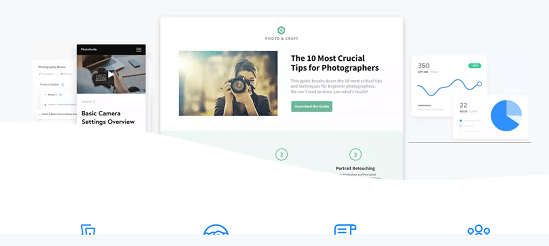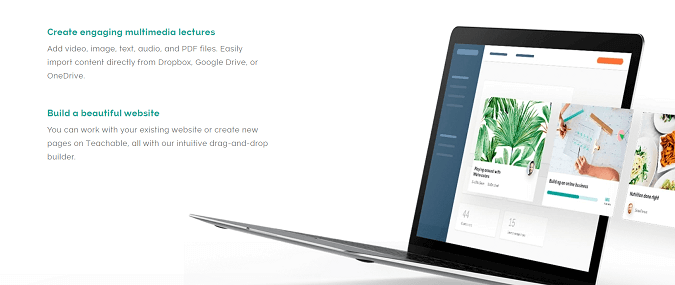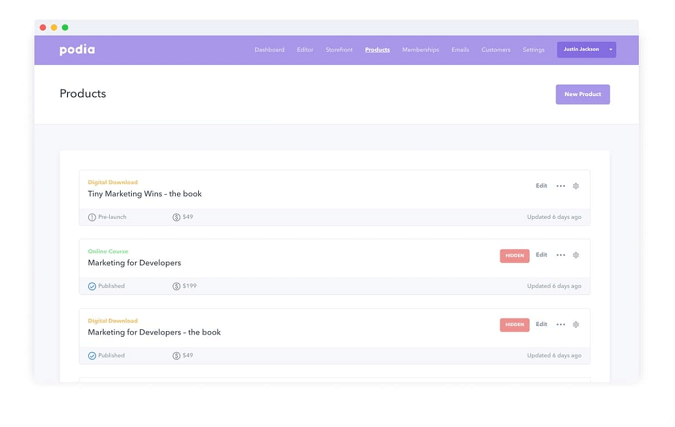Thinking about packaging your knowledge into an online course? Well, it’s an excellent time to do so. The worldwide e-learning market is set to reach an astonishing $325 billion by 2025.
In America, 77% of corporations use online learning. Not to mention the vast amount of citizens who take online courses in their free time.

Needless to say, there’s plenty of earning potential in the online course industry. All you need now is a platform that’ll make it easy to create an online course that looks and feels professional. Here’s a quick list to motivate you.
Kajabi

Why not start with one of the more in-depth platforms out there today? Kajabi is a robust platform filled with all the right features to make creating, uploading and managing your course content simple.
Plus, it allows you to evolve your business using tools like email marketing automation. Then you can grow your revenue by offering your students upsells and other digital products to purchase.
There’s even blogging functionality you can use to keep your students engaged and to attract prospective students to your course.
So what can you expect to pay for this all-in-one course marketing machine? About $119 a month which is the most popular option. However, there’s a cheaper basic plan, which runs you $149 a month.
Udemy

You’re thrilled about getting your course up and running, but you’re not ready to dish out the big bucks to do so. We’ve got you covered.
Udemy is a platform that’s excellent for first-timers who are launching their first course. It’s a popular choice among students and instructors alike.
There are currently over 24 million students enrolled in the courses published by roughly 35,000 instructors. To use this platform, you have to get approved as a premium instructor.
You can upload video lectures, quizzes, exercises, and discussion prompts to engage your students. As a bonus, Udemy helps to promote your course (for a fee). Whenever someone signs up for your course through their ads, Udemy gets a 75% cut.
The price? It’s free if you’re selling a premium course. Udemy works by taking a 3% cut for course sales made through instructor coupons. Then they take half when your course is found organically using Udemy’s search bar.
Thinkific

Not really into sharing a percentage of the sales made on the courses you put your blood, sweat, and tears into? Then Thinikific is an ideal choice to create an online course.
It doesn’t charge any transaction fees on any of its packages (paid or free).
You can opt for a monthly or annual rate – of course, it’s cheaper to go with annual ($49 a month vs $39 a month for annual). There’s also a free option if you want to test the waters before diving in.
It comes with user-friendly features and email marketing tools. If you’re plotting on charging your students monthly, then you’ll enjoy using its membership site integration for your course.
Once you’re ready to start publishing more courses, you can upgrade to $99 a month (for up to five courses). Then if you want to become a full-time instructor and go all out with 50 courses, you should be able to afford the $499 a month package.
Teachable

Organizing, developing, and publishing a course is great. Yet, you won’t get far if you don’t have the support to build up your audience (and brand).
You want to position yourself as an expert in the topic you’re teaching about. To do this, you’ll need to grow and nurture an online audience. After all, how can you be a leader with no followers?
With Teachable, you get a platform that helps you to design a unique look and feel for your course. Then you can use it to build a website that resonates with your brand.
You can even build and launch landing pages for your course. Programmer-minded individuals will also be delighted to know they can mess around with the code. However, if you’re not tech-savvy, then you can always opt for the templates.
Once you’re ready to go live, you can choose from a variety of payment styles. For instance, you can charge students a one-time fee, subscription fee, or payment plan.
To help with sales, you can create coupons and a team of affiliates to promote your course.
What do you pay for all of this? There’s a basic plan for $39 a month. With this, you get a custom domain, email, coupon codes, affiliate marketing, and drip course content. There’s also a 5% transaction fee.
Podia

Now, if you’re not a tech or design person, then you’ll vibe well with Podia. It acts as an online storefront for all of your content, such as courses, membership sites, and digital downloads.
It comes with similar templates, which makes the selection easier. For instance, each template comes with:
- Creator bios
- FAQs
- Content section
- What’s included section
- Course overview
After creating your online course and uploading it, you can publish it or do a pre-launch to gather emails for your campaign. It’s also worth mentioning that Podia integrates with Zapier.
There are resources you can create for your students, such as ebooks, audio, checklists, cheat sheets, and videos.
The plans start at $39 a month, and there are no transaction fees to worry about.
Go From Expert To Instructor
If you look around the web, you’ll find thousands of people making a living off of online courses. It takes careful planning and the right tools to pull off.
You already have the expertise in your industry – now it’s time to craft your knowledge into an easy-to-digest course. Using the above options, you can create your online course and take your piece of the market.